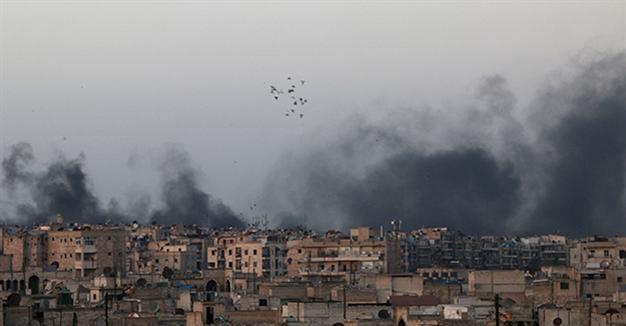US demands halt to Syrian regime’s Aleppo bombing
WASHINGTON

REUTERS photo
The United States on April 30 demanded that Syrian leader Bashar al-Assad’s forces halt their bombardment of the city of Aleppo and help restore a nationwide ceasefire, while nearly 30 air strikes hit rebel-held areas of the city on the same day as a temporary “calm” declared by Syria’s military took effect around Damascus and in the northwest.
In a statement detailing calls U.S. Secretary of State John Kerry has made over the past two days with U.N. Special Envoy for Syria Staffan de Mistura and with Riad Hijab, chief coordinator of the main opposition HNC bloc, U.S. State Department spokesman John Kirby said Kerry had made clear the United States wanted Russia to apply pressure to the Assad government to get it to stop “indiscriminate aerial attacks” in Aleppo.
“The secretary made clear that ending the violence in Aleppo and returning ultimately to a durable, nationwide cessation is a top priority,” spokesman John Kirby said.
“The secretary expressed his deep concern about the deteriorating situation in Aleppo, where the ... regime [of Assad] continues to escalate the conflict by predominantly targeting innocent civilians and parties to the cessation of hostilities - not Nusra, as the regime falsely claims,” Kirby said in a statement.
“Such attacks are direct violations of the cessation and must stop immediately,” he declared.
This past week, Russia and the United States agreed to pressure the parties to hold their fire in the Latakia and Eastern Ghouta, Damascus regions - but Aleppo was left out of the deal.
The Syrian army said the “calm” would last for 24 hours in the capital Damascus and its suburb Eastern Ghouta and for 72 hours in rural areas around the northern city of Latakia.
“The secretary underscored that the initial efforts to reaffirm the cessation of hostilities in Latakia and Eastern Ghouta are not limited to these two areas and that efforts to renew the cessation must and do include Aleppo.”
A truce was called in Feb. 27 between Assad’s forces and a coalition of rebels but has since begun to break down, particularly in the divided and besieged city of Aleppo.
Fierce bombing has continued in the city, with heavy civilian casualties, and Russia has made it clear it has no intention of reining in its ally Assad’s forces.
At least five people were killed in Aleppo early on April 30 in air strikes believed to have been carried out by Syrian government warplanes, the Syrian Observatory for Human Rights said.
Of the 250 casualties since April 22, 140 were killed in bombardments by government-aligned forces and 96 by rebel shelling. Forty children were among the dead, according to the Observatory’s tally.
Russian Deputy Foreign Minister Gennady Gatilov said April 30 that Russia will not ask the Syrian regime to halt air raids on the war-ravaged city of Aleppo, as it believes they are helping to combat jihadist groups.
“No, we are not going to put pressure on [Damascus] because one must understand that the situation in Aleppo is part of this fight against the terrorist threat,” Gatilov told the Interfax news agency, according to AFP.
With the peace process hanging by a thread, Kerry was to fly to Geneva on May 1 for talks with de Mistura and the Saudi and Jordanian foreign ministers.
“In all of his discussions, the Secretary [Kerry] will review ongoing efforts to reaffirm the cessation of hostilities nationwide in Syria, obtain the full humanitarian access to which the Syrian government committed, and support a political transition” as called for in a U.N. Security Council resolution, a statement issued by the State Department said.
A new round of U.N.-backed Syria peace talks is set to begin on May 10 in Geneva after the last round ended last week with no progress.
The head of a Syrian opposition group said April 30 that the prospects of finding a political solution to the Syria conflict are in danger unless the international community acts fast to pressure the regime.
“The regime is not really interested in a political solution and they are not really interested in hearing the cessation of the hostilities initiative,” the head of the Syrian National Coalition Anas al-Abdeh told AFP in Istanbul.
“We think that unless the international community does something about that, the whole prospect for the political solution will be in danger,” he added after a general assembly meeting of the main opposition umbrella grouping in the Turkish city.
Meanwhile, Doha has requested an “emergency” meeting of Arab League envoys to discuss deadly Syrian regime air raids on Aleppo, the official Qatar News Agency reported April 30.
Qatar’s permanent envoy at the Cairo-based pan-Arab body has requested holding “a meeting to discuss the dangerous escalation in the city of Aleppo and the Syrian regime forces’ massacres against civilians” there, said the statement on QNA.
